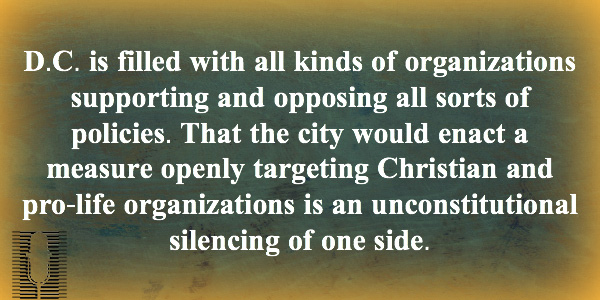When a bill has the word non-discrimination as part of its title, it’s wise to dig deeper. A measure that requires non-discrimination against one group usually ends up allowing, even encouraging, discrimination against another.
Proponents of the District of Columbia’s Reproductive Health Non-Discrimination Act — RHNDA — said it is needed to prevent employees in Washington D.C. from being discriminated against based upon their decisions regarding reproductive health.
The bill requires that the pro-life organizations and schools run by faith-based organizations that exist around the District provide healthcare coverage that includes elective, surgical abortions. RHNDA also injects abortion politics into hiring practices, penalizing even faith-based employers for refusing to hire someone who supports abortion.
So, the groups getting their rights violated here are the ones whose function is religious or pro-life. Catholic schools. Groups like Americans United for Life. Family Research Council.
Here’s what the Director of FRC’s Center for Religious Liberty, Travis Weber says about it:
“We can’t exist if our purpose is to advocate for a pro-life position, and we’re living under a regime which is telling us you can’t structure yourself as an organization and hire people to advocate for those positions. It’s very controlling and brings to mind an oppressive government monitoring of groups’ purposes.”
Under the Home Rule Act of 1973, Congress has the power to review all legislation passed by the District of Columbia and overrule it within 30 days using what’s called a “resolution of disapproval.” But Congress doesn’t flex this muscle very often. This hasn’t been done in 23 years.
The first provision of RHNDA, the part that forces groups that oppose abortion to provide insurance that covers it violates the religious liberty of schools and non-profits. Closely held businesses won that battle in the Hobby Lobby case that went to the U.S. Supreme Court. But other organizations still face the hand of government forcing its progressive morality even into hiring. Under RHNDA, religious schools would lose the ability to require employees to exhibit behavior consistent with the teachings of the Church.
This D.C. law — RHNDA — is such an overreach into the First Amendment rights of religious and pro-life organizations, the House took a stab at overruling it. Ultimate overturn of any D.C. law necessitates the Senate agree, and the signature of the president.
The House passed a resolution of disapproval of RHNDA, but the review period ended on May 2 without the Senate having acted. Some senators tried. Ted Cruz of Texas introduced a similar resolution.
D.C. is filled with all kinds of organizations supporting and opposing all sorts of policies. That the city would enact a measure openly targeting Christian and pro-life organizations is an unconstitutional silencing of one side.
Washington D.C. has become a testing ground for various radical agendas regardless of their legality. Congress missed one opportunity, but should now use the appropriations process or some other method to take the bite out of this one.
 Listen Online
Listen Online Watch Online
Watch Online Find a Station in Your Area
Find a Station in Your Area











 Listen Now
Listen Now Watch Online
Watch Online
